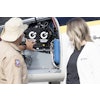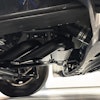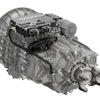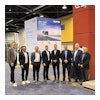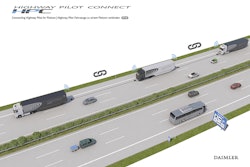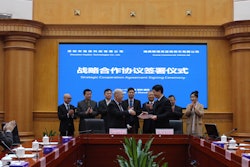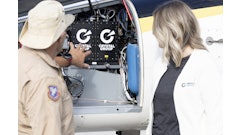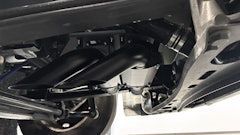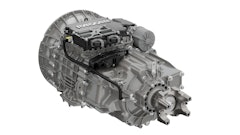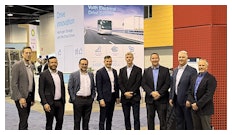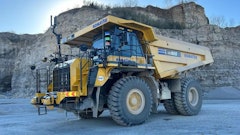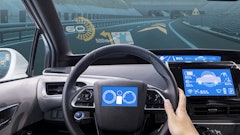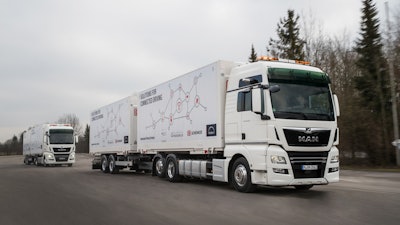
DB Schenker, MAN Truck & Bus and Hochschule Fresenius are deploying networked trucks for the first time in a practical application in the logistics industry. On February 13, MAN handed over the test vehicles for the joint platooning project to DB Schenker at its headquarters in Munich. On behalf of the Essen-based logistics group, Chief Operating Officer, Ewald Kaiser, accepted the keys for the new MAN platooning vehicles from Dr. Frederik Zohm, Member of the Management Board for Research and Development MAN Truck & Bus AG. "Autonomous and networked driving will fundamentally change road haulage. This project will focus on testing platooning for the first time in daily logistics operations. So we’re excited that we can now integrate the vehicles into the operational test runs," Kaiser emphasizes.  MAN handed over the pilot vehicles for the joint platooning project to DB Schenker and the Hochschule Fresenius at its Munich headquarters. Ewald Kaiser, Chief Operating Officer DB Schenker (Center), and Prof. Dr. Christian T. Haas (right), Vice Dean Research at the Hochschule Fresenius, accepted the keys for the new MAN Platooning vehicles from Dr. Frederik Zohm (left), Member of the Board of Management for Research and Development MAN Truck & Bus AG.
MAN handed over the pilot vehicles for the joint platooning project to DB Schenker and the Hochschule Fresenius at its Munich headquarters. Ewald Kaiser, Chief Operating Officer DB Schenker (Center), and Prof. Dr. Christian T. Haas (right), Vice Dean Research at the Hochschule Fresenius, accepted the keys for the new MAN Platooning vehicles from Dr. Frederik Zohm (left), Member of the Board of Management for Research and Development MAN Truck & Bus AG.
"We have already proved that platooning technology works in various predecessor projects, such as the European Truck Platooning Challenge in 2016. Adapting this technology to the real every day conditions of the logistics sector is the challenge we are now tackling," adds Dr. Zohm from the truck manufacturer's perspective.
The cooperative venture established in May 2017 will test truck convoys over a period of several months as part of DB Schenker's scheduled operations in real traffic scenarios on the A9 freeway between Munich and Nuremberg. This will also be the first time that professional truck drivers from DB Schenker will replace test drivers at the wheel. Their experiences, assessments and evaluations of platooning are the focal point of the work at Hochschule Fresenius, which is providing the scientific support for the test drives as the third partner of the cooperative venture. "We want to find out what impact the new technology has on the drivers. The study focuses on the neurophysiological and psychosocial levels," explains Prof. Dr. Christian T. Haas, Head of the Institute for Complex Health Research at Hochschule Fresenius. "The results of the study at the human-machine interface will be fed back directly into developing the technology." The scenario also offers the opportunity to make general findings in terms of digitalizing working conditions and would thus serve as a forerunner for other projects.
The vehicle handover signals the start of preparations for the road tests. While recent months have been occupied with producing the test vehicles and equipping them with the additional technical components required for deploying platooning, the focus is now on intensive training of the drivers for their tasks in the project and ultimately on facilitating integration with DB Schenker's logistics operations.
As of April, individual runs of the platoon are planned on the A9. To begin with, the trucks will be operating without any cargo to investigate driving conditions in the daily flow of traffic, and to train the drivers involved in the project in operating the vehicles. The drivers will receive intensive theoretical and practical training from the specialists at MAN ProfiDrive and will practice on a driving simulator. Hochschule Fresenius will be accompanying the drivers and documenting their experiences.
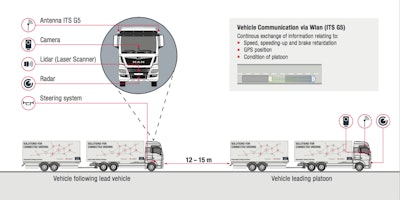
Once the intensive training phase has been completed, there will be weekly, and then daily test runs. These will be extended to include regular operations with actual cargo during the course of 2018. The platoons will then be deployed up to three times daily between DB Schenker logistics centers in Munich and Nuremberg.
Platooning is a road vehicle system in which at least two trucks on the freeway can travel in close succession with the help of technical driving assistance and control systems. All of the vehicles in the platoon are linked to each other by an electronic "towbar" that uses car-to-car communication where the truck in front sets the speed and direction.
In this context, electronic coupling of the vehicles in the platoon guarantees traffic safety. One essential objective of platooning is to ensure fuel savings for the entire platoon through slipstreaming.
